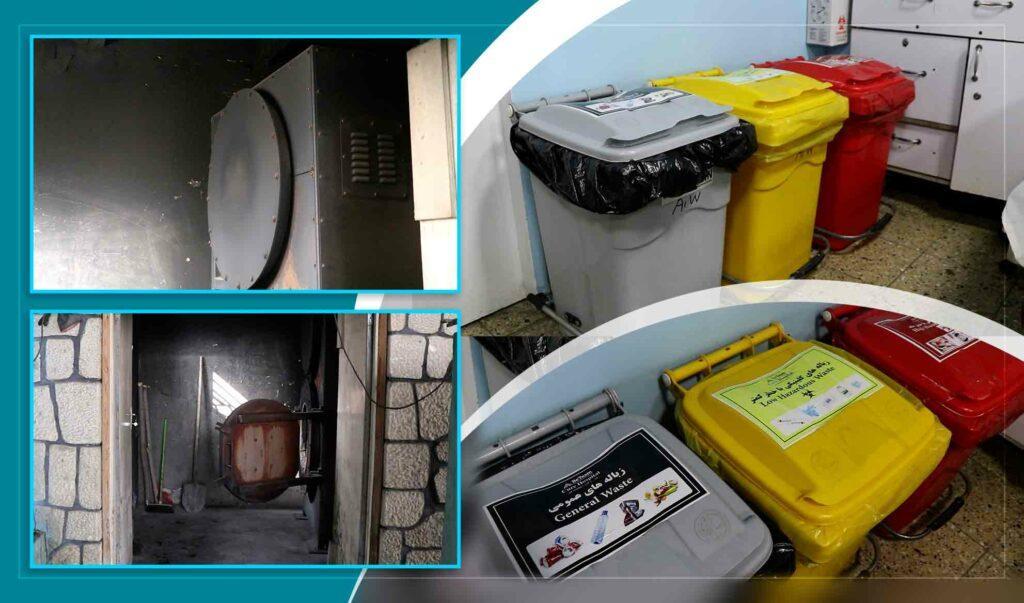
Medical Waste Serious Threat To Public Health, Environment: Experts
KABUL (Pajhwok): Health experts say medical waste may appear harmless, but it can pose significant environmental and health hazard and can lead to serious diseases and serve a vector in transmission of infections.
With a rapid growth of the population and the unprecedented expansion of healthcare centers in Kabul, the volume of medical waste has risen dramatically, becoming a major concern for both citizens and experts in the fields of healthcare and environmental protection.
Improper management of healthcare waste not only threatens public health, but also poses serious risks to the city's environment, requiring serious attention of authorities and the implementation of sustainable solutions.
Medical waste: From production to disposal
Dr. Faraat Diba Noori, head of the infection prevention and control department at the Cure Hospital, said that there are four types of waste in hospitals - high-risk waste, moderately risky waste, general waste (municipal waste), and safety waste.
She added that proper management of medical waste involves six stages, starting from patient rooms and operating theaters and ending up in designated storage facilities. If not properly managed, medical waste can cause numerous health problems and environmental contamination.
She explained that machine used to incinerate medical waste was called an“incinerator,” which turns the waste into gas, smoke, and ash. The machine has two sections: in the first section, medical waste is heated to 700-1000°C, and in the second section, it is heated to 1000-1200°C. The smoke is filtered to prevent environmental pollution.
Dr. Noori also said training programs were held for hospital staff to improve their understanding of waste handling and self-protection measures.
She emphasized that all hospitals should be more closely monitored by the government to ensure they have incinerators, as medical waste can be hazardous.
Risk of diseases transmission
Dr. Mohammad Adil Akhtar, a specialist in maxillofacial surgery and an expert in public health, told Pajhwok Afghan News that medical waste was one of the major challenges in the spread of various diseases, including viral, bacterial, and life-threatening cancers.
He explained that certain materials in medical waste can be radioactive, posing additional dangers.
Dr. Akhtar pointed out that in underdeveloped countries like Afghanistan, where there is limited public awareness and the healthcare system is inadequate, medical waste can significantly contribute to the spread of diseases.
He emphasized that medical waste contains blood products, which not only put humans at risk but also endanger animals.
He classified medical waste into three categories: high-risk, moderate-risk, and low-risk waste.
Dr. Akhtar warned that if medical waste is not properly disposed of, it can become a vehicle for transmitting of infectious diseases, such as tuberculosis, HIV/AIDS, Hepatitis B, Hepatitis C, and other serious illnesses.
Dr. Mohammad Hashim Wahaj, head of Wahaj Hospital and a diagnostic disease specialist, also highlighted various types of medical waste, including sharp objects, blood-contaminated waste, and consumables.
He stressed that all waste should be collected in separate containers and disposed of according to established protocols.
Dr. Wahaj recommended that every hospital should have an incinerator to burn medical waste, but if they do not have one, they should collaborate with specialized companies for proper disposal.
He emphasized that disposing of medical waste in general trash bins can be extremely harmful, as it could lead to contamination if someone comes in contact with it.
Health workers at risk
Dr. Mohammad Jawad, head of the vaccination department at Khyber Hospital, said that some hospital staff exposed to contaminated medical waste during operations or while handling waste sought vaccination.
He advised them to wash their hands thoroughly, bandage affected area, undergo laboratory tests, and then get vaccinated. He noted that without vaccination, the risk of disease transmission is high.
Kabul Municipality's view
Nimatullah Barakzai, a representative of Kabul Municipality, told Pajhwok that the municipality has a defined waste management system, and all medical waste is disposed of scientifically through a specific method.
He emphasized that no hospital is allowed to mix medical waste with regular waste, and Kabul Municipality is responsible for its transfer.
Public role in reducing risks
Eng Wahidullah Muskinyar, a Kabul resident, said that medical waste poses significant risks, and the public must be cautious.
He recommended the use of machinery in hospitals to ensure that waste is disposed of properly.
Pajhwok also attempted to get the Ministry of Public Health's perspective on the matter, but Dr. Sharafat Zaman, the ministry's spokesman, did not respond despite multiple attempts to contact him.
Government monitoring healthcare centers
Ahmad Faseel Baryali, head of the Inspection and Supervision Department of the National Environmental Protection Agency, spoke to Pajhwok about the agency's efforts in managing medical waste and its achievements.
He added that one of their major accomplishments was holding meetings and reaching agreements with relevant departments.
He explained that municipal, chemical, medical, construction, and industrial waste must be identified by the public, with medical waste being the most hazardous to human health.
NEPA has formed a committee comprising representatives of 11 organizations to monitor waste management, which operates not only in Kabul but also in all provinces.
According to Baryali, the committee submits monthly reports to the agency, and companies responsible for collecting medical waste are licensed by NEPA. Hospitals, clinics, laboratories, and other medical centers that produce medical waste are registered with the agency, and they are regularly monitored.
He added that field teams in 22 districts of Kabul are responsible for monitoring these centers. In case of violations, the centers are first asked to sign a written commitment, and a legal action is taken if they repeat the violation.
Baryali urged the citizens of Afghanistan to exercise caution and cooperate with the relevant authorities in this matter.
sa/ma

Legal Disclaimer:
MENAFN provides the
information “as is” without warranty of any kind. We do not accept
any responsibility or liability for the accuracy, content, images,
videos, licenses, completeness, legality, or reliability of the information
contained in this article. If you have any complaints or copyright
issues related to this article, kindly contact the provider above.


















Comments
No comment